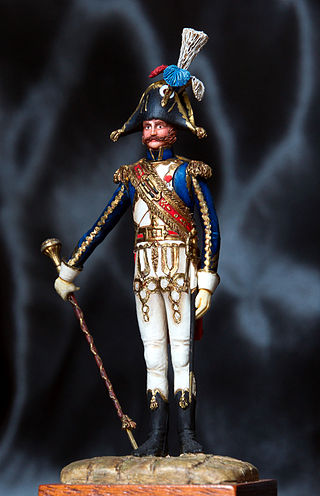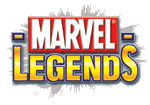An action figure is a poseable character model figure made most commonly of plastic, and often based upon characters from a film, comic book, military, video game or television program; fictional or historical. These figures are usually marketed toward boys and adult collectors. The term was coined by Hasbro in 1964 to market G.I. Joe to boys.
The Mego Corporation is an American toy company that in its original iteration was first founded in 1954. Originally known as a purveyor of dime store toys, in 1971 the company shifted direction and became famous for producing licensed action figures, celebrity dolls, and the Micronauts toy line. For a time in the 1970s, their line of 8-inch-scale action figures with interchangeable bodies became the industry standard.

A model figure is a scale model representing a human, monster or other creature. Human figures may be either a generic figure of a type, a historical personage, or a fictional character.
Diaclone is a toyline by Takara Toys launched in 1980. It consisted of transforming vehicles and robots piloted by miniature, magnet-shoed figures spun off from the prior Microman toy line.

Microman was a science fiction toyline created, manufactured and marketed by Takara Co., Ltd. from 1974 to 1984 as well as from 1998 to 2007. The Microman line was a series of 3.75-inch-tall (9.5 cm) action figures with accompanying vehicles, robots, playsets and accessories. Unlike other toylines at the time, Microman figures were marketed as being the "actual" size of cyborg beings called "Micros" that hailed from a fictional planet known as "Micro Earth" and disguised themselves as action figures while on planet Earth.
The long-running British science fiction television series Doctor Who has since its beginnings in 1963 generated many hundreds of products related to the show, from toys and games to picture cards and postage stamps. This article is not an exhaustive list of merchandise but attempts to present a flavour of the type of material that has been produced. This entry mainly concentrates on "official" spin-offs, that is to say, material sanctioned by the British Broadcasting Corporation, which produces the series.

Marvel Legends is an action figure line based on the characters of Marvel Comics, initially produced by Toy Biz, then by Hasbro. This line is in the 6-inch (150 mm) scale, with spin-off lines in the 4-inch (100 mm), 8-inch (200 mm), and 12-inch (300 mm) scale.

SOTA Toys, or State Of The Art Toys, is a developer, manufacturer, and wholesaler of collectibles based on licensed properties from companies such as Capcom and Universal. Formed in 2000 by Jerry Macaluso, they have created and manufactured numerous licensed products based on the characters from popular films, TV shows, hit video games, and literary works, as well as legendary musicians and pop stars. Aside from being a developer and manufacturer, SOTA Toys also serves as fabricator and prototyper for the motion picture, toys/collectibles, and video game industry.

Lego Space is a Lego theme, which includes astronauts, space colonization, spaceships and extraterrestrial life. It was originally introduced in 1978. It stands as one of the oldest and most extensive themes in Lego history, consisting of over 200 individual sets. Lego Space has been marketed and sold under the Legoland and Lego System banners.

The Super Powers Collection was a line of action figures based on DC Comics superheroes and supervillains that was created by Kenner Products in the 1980s.
The Hasbro G.I. Joe Hall of Fame era of 12" action figures began in 1991, when Hasbro released the Target Exclusive Duke in response to the high demand from nostalgic collectors of the vintage era G.I. Joe action figures. Duke was the first 12" (30 cm) action figure produced in the Hasbro G.I. Joe line since 1978. During the G.I. Joe Hall of Fame era, Hasbro introduced several new products to the world of action figure collectibles. The first innovation was the limited edition, individually numbered collectible figures. These figures had collectors scrambling to find the lowest numbers which were expected to have the highest resale value. Hasbro also used variant sets to increase demand and interest in the figures. Additionally, talking voice chips were used in some figures; and limited edition action figure sets were released for the Street Fighter II video game and movie characters, and also for the Mortal Kombat characters.
G.I. Joe Adventure Team is a line of action figures produced by the toy company Hasbro. The line is well remembered by the inclusion of features such as "Kung-Fu Grip", "Life-Like Hair" and "Eagle Eyes".

Keshi aka keshigomu is the Japanese word for eraser. In modern "keshi" refers to a collectible miniature figure, often of a manga or anime character, made of coloured hard rubber. However, the word's reference has broadened beyond its etymological meaning, as keshi are made of several types of rubber, ranging in appearance from opaque matte to transparent. Also, some lines, such as the "Cosmos Souls Keshi Gum", use plastic parts. Keshi figures are not necessarily based on Japanese comic book or TV series franchises, since there are keshi dedicated to video games and some western lines are based on local mythologies and popular culture. A similar product is often mistakenly thought be keshi, the pencil cap toy which appeared around the same period.
Kinkeshi is an extensive and popular line of collectible erasers, an instance of the modern Japanese popular culture institution of keshi. The keshi it includes are monochromatic and derived from the Kinnikuman (キン肉マン) anime and manga franchise, whose primary motif is professional wrestling.
Transformers: Generation 1 is a toy line from 1984 to 1990, produced by Hasbro and Takara Tomy. It was a line of toy robots that could change into an alternate form by moving parts into other places, and it was the first line of toys produced for the successful Transformers toy and entertainment franchise. The line was originally called The Transformers, with "Generation 1" originating as a term coined by fans of the toys when the Transformers: Generation 2 toy line was released in 1992. Hasbro eventually adopted the term "Generation 1" to refer to any toy produced in that era.

Between 1978 and 1985, Kenner produced and sold action figures based on the Star Wars franchise. From a line of over 100 unique toys, a total of more than 300 million units were sold during their original run. Kenner began producing new Star Wars action figures in 1995.
Popy (ポピー) was a Japanese toy manufacturer of the 1970s and early 1980s. The company was owned by Bandai. It was founded in 1971 and merged back into the parent company in 1983. The company is best known for its groundbreaking Chogokin robot figures.

Kid Acero was the name under which CIPSA—a regional Mattel subsidiary—used to distribute and sell the popular Big Jim line of action figure toys for the Latin American market. While most of the toys were exactly the same as the US templates, a few of them were retooled, repainted and repurposed, and sold using different names and scenarios. These variations are notoriously hard to find, even at local markets and international auctions. Most of the series focused on two enirely different characters: Kid Acero and James Bond. For over five years a comic book series dedicated to the Kid Acero toy line was also produced; the character proved a very successful franchise.
Secret Wars was a 1984-1985 line of action figures and playsets, launched as a tie-in between Marvel Comics and the Mattel toy company.
Atlantic was an Italian toy manufacturing company based in Treviglio, being in business from 1966 to 1984. In the 1970s it became widely popular both in Italy and in Europe as a producer of scale models ships, 1:72- and HO-scale toy soldiers, board games.








